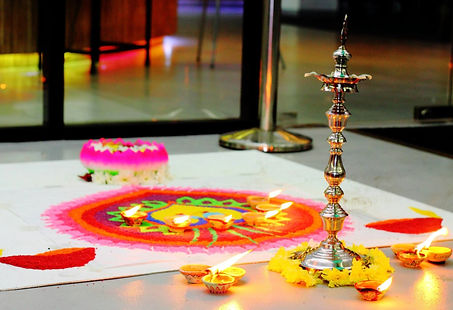Indian Festivals

I'm a paragraph. Click here to add your own text and edit me. It’s easy. Just click “Edit Text” or double click me and you can start adding your own content and make changes to the font. I’m a great place for you to tell a story and let your users know a little more about you.
Deepavali
Deepawali or Diwali is certainly the biggest and the brightest of all Hindu festivals. It's the festival of lights (deep = light and avali = a row i.e., a row of lights) that's marked by four days of celebration, which literally illumines the country with its brilliance, and dazzles all with its joy. Each of the four days in the festival of Diwali is separated by a different tradition, but what remains true and constant is the celebration of life, its enjoyment and goodness. In Malaysia, we only celebrate Deepavali for two days. The eve of Deepavali, where family reunions has evolved into a tradition and the next morning, where certain rituals like taking oil bath is performed followed by a visit to the temple.
The Origin of Diwali
Historically, the origin of Diwali can be traced back to ancient India, when it was probably an important harvest festival . However, there are various legends pointing to the origin of Diwali or 'Deepawali.'
-
Some believe it to be the celebration of the marriage of Lakshmi with Lord Vishnu.
-
Whereas in Bengal the festival is dedicated to the worship of Mother Kali , the dark goddess of strength.
-
Lord Ganesha , the elephant-headed God, the symbol of auspiciousness and wisdom, is also worshiped in most Hindu homes on this day.
-
In Jainism , Deepawali has an added significance to the great event of Lord Mahavira attaining the eternal bliss of nirvana .
-
Diwali also commemorates the return of Lord Rama along with Sita and Lakshman from his fourteen year long exile and vanquishing the demon-king Ravana. In joyous celebration of the return of their king, the people of Ayodhya, the Capital of Rama, illuminated the kingdom with earthen diyas (oil lamps) and burst crackers.
The Significance of Lights & Firecrackers
All the simple rituals of Diwali have a significance and a story to tell. The illumination of homes with lights and the skies with firecrackers is an expression of obeisance to the heavens for the attainment of health, wealth, knowledge, peace and prosperity. According to one belief, the sound of fire-crackers are an indication of the joy of the people living on earth, making the gods aware of their plentiful state. Still another possible reason has a more scientific basis: the fumes produced by the crackers kill a lot of insects and mosquitoes, found in plenty after the rains.
The Tradition of Gambling
The tradition of gambling on Diwali also has a legend behind it. It is believed that on this day, Goddess Parvati played dice with her husband Lord Shiva , and she decreed that whosoever gambled on Diwali night would prosper throughout the ensuing year. Diwali is associated with wealth and prosperity in many ways, and the festival of ' Dhanteras ' ('dhan' = wealth; 'teras' = 13th) is celebrated two days before the festival of lights. Family members all come together sit on the floor in a circle and play gambling card games. Childrens are often not involved in this game. Although it is not the most ideal game, but it creates a very care free mood and family members talk stories and make jokes while playing this game, thus forming stronger bonds. This tradition is fading away as most family do not practice it in upcoming years
From Darkness Unto Light...
In each legend, myth and story of Deepawali lies the significance of the victory of good over evil; and it is with each Deepawali and the lights that illuminate our homes and hearts, that this simple truth finds new reason and hope. From darkness unto light — the light that empowers us to commit ourselves to good deeds, that which brings us closer to divinity. During Diwali, lights illuminate every corner of India and the scent of incense sticks hangs in the air, mingled with the sounds of fire-crackers, joy, togetherness and hope. Diwali is celebrated around the globe . Outside India, it is more than a Hindu festival, it's a celebration of South-Asian identities. If you are away from the sights and sounds of Diwali, light a diya , sit quietly, shut your eyes, withdraw the senses, concentrate on this supreme light and illuminate the soul.
Light Fest in Taylors College.
Light Fest was held in our college last year to celebrate Diwali as a family. This truly brought the staffs and students of different races together and formed stronger bonds between us all. The joyous celebration mood filled the air as booths were set up to play traditional indian games and performances were held throughout the night. They were also served with traditional Indian Curry Rice and Deepavali snacks like muruku and mixer (omapudi). It was a great platform for non Indians to get an insight about Deepavali.

